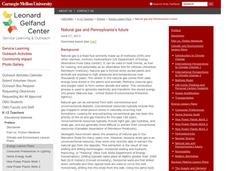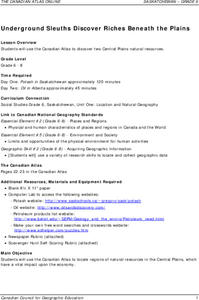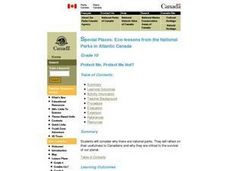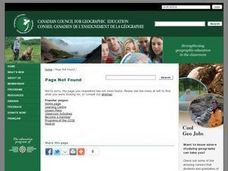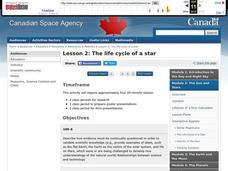Carnegie Mellon University
Natural Gas and Pennsylvania’s Future
Beginning with a general discussion about natural gas, methane, and hydrocarbons, a few videos and diagrams are projected to support the lecture. Individuals participate in a brief activity by drinking juice through a straw, and then...
Curated OER
Canada's Forests and Resource Management
Students are introduced to the Canadian forest industry so that they may assess the economic and environmental sustainability of the industry.
Curated OER
They're Tilling that Field Behind the Mall
Unfortunately, the article for which this resource was written is not available. You can, however, find another current document on agriculture and urban development for your class to read together, and then still follow the suggested...
Curated OER
In Harm's Way: Natural Disasters in My Community
Eleventh graders research and debate natural disasters that have occurred in their community. They assess whether these natural disasters were avoidable or were accidents. They investigate the extent of insurance coverage for disasters.
Curated OER
Underground Sleuths Discover Riches Beneath the Plains
Students identify Alberta, Saskatchewan, and Manitoba on map, and use Canadian Atlas to locate regions of natural resources in Central Plains, which have vital impact upon the economy. Students then complete scavenger hunt worksheet.
Curated OER
Diversity/Journalism - Book Making
Third graders explore Canadian culture by creating a book. In this community analysis lesson, 3rd graders identify the First Nations people of Canada and discuss the culture, language and diversity. Students create a book discussing...
Curated OER
A Canadian Inventory: The Way We Are!
Young scholars, in groups, explore major thematic sections of the Atlas of Canada. They use their findings to produce a wall display, consider and incorporate the issue of sustainability into their material and deliver a presentation to...
Curated OER
Canada's Role in Astronomy and Space Science
Ninth graders, in groups, research a Canadian astronaut, developing a profile of their astronaut for presentation in a learning center. They visit the other groups' centers to explore more astronauts.
Curated OER
Polar Day: Living in the Canadian North
Pupils study the Canadian North. In this Canadian North lesson plan, students study the physical characteristics and the lifestyles of people in that region. Pupils complete map making and creative activities that help them learn about...
Curated OER
Terrestrial Ecozones, Population Density and Species at Risk
Tenth graders navigate and use the online Atlas of Canada. They explain the cause and effect relationship between human settlement and the natural environment and wildlife species. They utilize a worksheet imbedded in this plan.
Curated OER
Watering Our Prairie Farms
After reading an article about irrigation on Canadian farms, learners participate in a discussion. They individually write an opinion paper about the surrounding issues. A lesson like this can be used in an earth science class when...
Curated OER
Protect Me, Protect Me Not?
Students brainstorm natural resources found in Canadian National Parks. They, in teams, defend and support conservation efforts and give a presentation. Evaluation consists of speaking on both pro and con sides of a national parks' issue.
Curated OER
Infiltration
Young scholars investigate how the amount of water that can infiltrate into the soil is influenced by precipitation factors and the nature of the soil. The precipitation factors are type of precipitation, amount, duration and intensity...
Curated OER
Canada...a Visual Journey
Learners, in groups, research Canada's six natural regions (ecozones). They create a visual representation of each region on a large wall map of Canada and present it to the rest of the class.
Curated OER
Precious Water: Is it a Need, a Right, or a Commodity?
Students determine whether water is a need, a right, or a commodity. In this water lesson, students investigate land and water ecosystems through activities. Students also discover water as a resource and energy source as they observe...
Curated OER
Driving Forces Forestry In Canada
Learners discuss the natural and economic impact of forests and forestry. Using given statistics they construct different types of graphs in which they make observations and draw conclusions.
Curated OER
Watch Your Water Use
Students record their freshwater usage over a period of a week. They calculate the amount of water used for all water activities such as brushing teeth, flushing the toilet, showering, and washing the dishes. They use an online tally to...
Curated OER
Changing With the Tide
Students describe three different aspects or life forms of the salt marsh. They compare and contrast the low and high marsh. Students explain what happens in different areas of the marsh at low and high tide; and explain the roles...
Curated OER
The Solar Cycle
Students research the solar cycle. In this Science lesson, students use the internet to investigate the solar cycle. Students produce a spreadsheet and graph from the information collected.
Curated OER
Time Line of Astronomy Events and Discoveries
Students work in groups to present a segment of a timeline of events and discoveries in astronomy. In this astronomy lesson plan, students teach their classmates about their section of the timeline.
Curated OER
The Life Cycle of a Star
Students investigate the life cycle of a star and make conclusions based on evidence, research, and observation. In this lesson on space and scientific investigation, students describe the relationships between science and...
Curated OER
Modeling the Big Bang and the Formation of the Universe
Sixth graders conduct an experiment to understand the Big Bang Theory. In this Big Bang Theory lesson, 6th graders will observe a balloon with confetti popping to emulate and analyze information related tot he Big Bang theory....
Curated OER
Prairies
Students identify the basic characteristics of the prairie ecosystem, and several commonly known prairie species. They create a classroom mural of a prairie ecosystem; and create reports about what they have found out.
